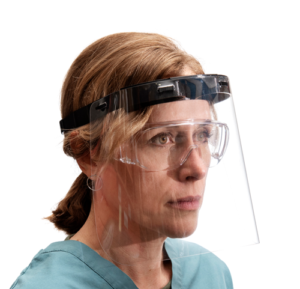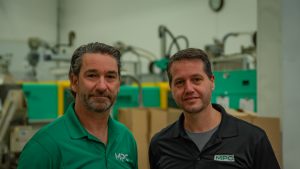
Ontario injection molder reinvents itself making PPE
Canadian Plastics
Canadian Plastics Plastics Processes COVID-19Molded Precision Components has transitioned from manufacturing gears and other parts for the automotive sector to PPE, and is now busier than ever.
Molded Precision Components (MPC), a full-service injection molding specialist located in rural Oro-Medonte, Ont. – about 15 km north of Barrie – has really shifted gears during the COVID-19 pandemic.
The engineering and injection molding company has spent the past 15 years building its business by manufacturing gears and other parts primarily for the automotive sector, using a variety of tools like 3D printing, product design and precision injection molding. But with auto sales going down as the pandemic first hit in March, the company took a leap of faith: shifting focus to create new face shields and to make parts for ventilators. “By late March, all of our orders from the automotive sector stopped,” said company president and co-owner David Yeaman. “At the time, we had a staff of 55 very talented people and instead of sending them home we figured it would be best to use our resources, our engineering, tubing and manufacturing expertise, to help fight COVID-19.”

A Shield-U face shield. Photo Credit: Molded Precision Components
Yeaman, his business partner Thomas Woegerer, and MPC’s team of engineers worked around-the-clock to design a medical face shield and a machine that could produce them. In the end, MPC set up a joint venture with Concord, Ont.-based medical device maker Sterling Industries and the two companies launched the Shield-U face shields, developed in response to the dire shortage of personal protective equipment (PPE) in Canada during the pandemic.
MPC molds the head band strap portion of the face shield, while Sterling produces the face shield portion that holds the strap. A Class 1, Health Canada-approved medical device, Shield-U is a one-size-fits-all shield that offers full face protection from direct droplet transmission. Made from 100% bio-compatible, medical grade PET and LDPE materials, Yeaman said, the shields are designed to stay in place even under rapid or extremes of movement, and have an open top that maintains air flow and prevents visor fogging. They’re also fully recyclable, lightweight, and comfortable with durable headbands and can be fully sanitized.
The shields went into production in late April. MPC produced parts for 4,000 shields a day in the beginning, but expects to ramp up to 450,000 per day once all of its machines are retooled by the end of June. From its pre-pandemic staff size of 55, MPC currently has 160 workers, including 65 students. Indeed, MPC has now expanded so much that it teamed up with the township of Oro-Medonte to use the local community centre arena as a warehouse; and as of mid-June, the company had also donated 600 of its Shield-U face shields to the Downtown Barrie Business Association (BIA), and is in the process of donating 25,000 more to the Barrie community at large, particularly to restaurants and other businesses in the Barrie area that have already opened or will be opening soon. “Many of these businesses simply can’t get operational again without PPE, so we’re very happy to put a locally-manufactured solution in their hands,” Yeaman said.
In the end, MPC managed to shift its entire focus from making auto parts to producing face shields for frontline workers within one month. “What would normally be a two-year development process, we’ve pulled off in four weeks,” Yeaman said. And it couldn’t have been achieved without complete, enthusiastic buy-in from all of MPC’s staff, he added. “We’ve never laid anyone off and we were determined not to start now, and our workers definitely didn’t want to stop working,” Yeaman said. “They could have stayed at home and collected emergency benefits but they wanted to help protect health care workers and others by making these masks. As one of our staff put it, he wanted to be able to tell his young son that he’d helped fight against the pandemic.”

David Yeaman (left) and Thomas Woegerer. Photo Credit: Molded Precision Components
MPC’s current focus on PPE takes it a long way from where the company first began. Originally founded in 1980 under the name Molded Plastic Consultants, the firm was run for the next quarter century as a simple prototype molding shop with just a few machines. The reinvention began in 2006, when Yeaman and Woegerer purchased MPC’s assets with the goal of turning it into a multi-disciplinary engineering, toolmaking, product development, and precision injection molding service that made gears, bearings, cable end fittings, multi-component housings, and other precision parts. The name change to Molded Precision Components was made in March 2019 to reflect that.
And the reinvention isn’t over yet. “We were actually in the process of moving into medical parts making before the pandemic hit,” Yeaman said. “COVID-19 has really just accelerated this. We’ve just acquired 83 acres of land in Oro-Medonte for further expansion, and we’ll be around as medical part makers after the pandemic is over.”
